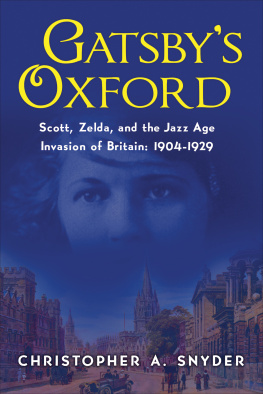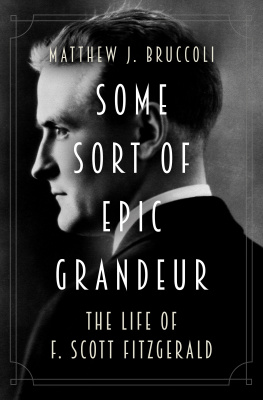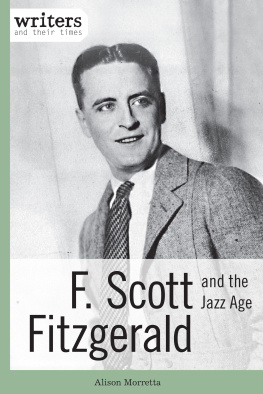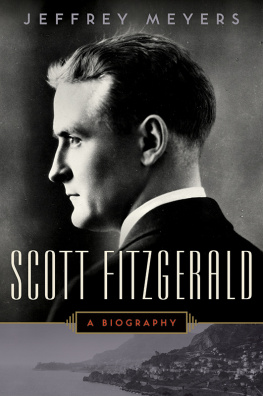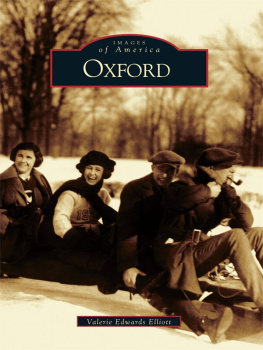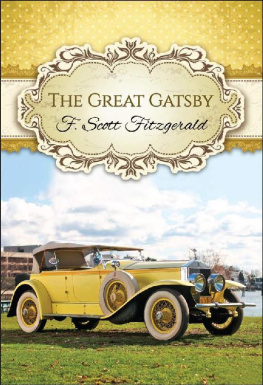
GATSBYS
OXFORD
Scott, Zelda, and the Jazz Age
Invasion of Britain: 19041929
Christopher A. Snyder

PEGASUS BOOKS
NEW YORK LONDON
To God
Hope
Dream
Love
university town, little commented on, in Fitzgeralds other writings. That is the aim of this chapter, presenting the evidence of Fitzgeralds own words along with the musings of Fitzgerald scholars to begin answering the question: Was Jay Gatsby an Oxford man?
Oxford in The Great Gatsby
There is a dramatic buildup to the introduction of Jay Gatsby in the novel. Fitzgerald first presents his narrator, Nick Carraway, and it is important to remember that everything we know about Gatsby comes through the filter of Nick. Nick tells us first about himself: that he is the most honest person he knows, that he is inclined to reserve all judgments as a matter of infinite hope, but also that his tolerance... has a limit (5). In college, Nick was rather literary, he confesses, and was unjustly accused of being a politician because he was privy to the secret griefs of wild, unknown men. He did not seek out the confidences of such men. They found him, as did so many of the characters he would meet and socialize with in New York in the summer of 1922.
Despite his claim of disinterest in these privileged glimpses into the human heart, one figure alone stands out from the rest and haunts Nick: Jay Gatsby. Though he represented everything for which [Nick] had unaffected scorn... there was something gorgeous about Gatsby, some heightened sensitivity to the promises of life (6). Gatsby had an extraordinary gift for hope, a romantic readiness such as I have never found in any other person.
Gatsbys dreaming romanticism contrasts with Nicks practicality. Nick has come East after the war to sell bonds, renting a modest cottage in West Egg, on Long Island Sound. His cottage is dwarfed by that of his neighbor, an imitation of a French-Gothic town hall with an ivy-covered tower on one side (8). Our introduction to Gatsby is again delayed; Nick first visits the only people he knows on Long Island, the Buchanans of old-money East Egg. Tom Buchanan (from Chicago) was a friend of Nicks at Yale, while Daisy Fay Buchanan (from Louisville) is Nicks second cousin. Staying with the Buchanans that summer is Jordan Baker, a recently famous golfer. Nick gets swept up in the affairs of these three peoplerich, careless, and often dishonest. They are his initiation to life in New York, and ours.
Apart from a glimpse of Gatsbys silhouettetrembling arm reaching out to a distant green light across the bayNicks first meeting with his neighbor is delayed, once more, by the Buchanans. Tom whisks Nick off to the city, stopping in the valley of ashes to collect his mistress, Myrtle Wilson, right from under the nose of her husband and under the watchful eyes of Dr. T. J. Eckleburg, brooding high on a billboard (21). Against his wishes, Nick is swept away into a house-party, and domestic melodrama, of sorts, in middlebrow Washington Heights. Apart from Nick getting drunk (for only the second time in his life, he tells us), the episode serves mainly as a contrast to the next party, just as the volatile Myrtle and Tom serve as a contrast to Gatsby and Daisy.
Nick receives a formal invitation soon after to a party at his neighbors mansion, one of the few guests who do. (People were not invitedthey went there [34].) At first, lost in a sea of unfamiliar people, Nick was surprised by the number of young Englishmen at the party, all well dressed... and all talking in low, earnest voices to solid and prosperous Americans (35). Then he sees Jordan Baker, and the pair are drawn into conversation regarding their mysterious host, one person suggesting that Gatsby had killed a man, another that he was a German spy, and yet another who insisted that he fought in the American army in the war (3637). Nick and Jordan leave the gossips to go find their host, and end up walking into a high Gothic library, paneled with carved English oak, and probably transported from some ruin overseas (37). When they return to their table they are joined by new faces, and, after more glasses of champagne and a lull in the entertainment, a stranger approached Nick:
Your face is familiar, he said, politely. Werent you in the Third Division during the war?
Why, yes. I was on the ninth machine-gun battalion.
I was in the Seventh Infantry until June nineteen-eighteen. I knew Id seen you somewhere before. (39)
The man invites Nick to go for a ride in his hydroplane in the morning, and Nick is surprised to learn that this elegant young roughneck, a year or two over thirty, whose elaborate formality of speech just missed being absurd, is none other than Gatsby himself.
I thought you knew, old sport. Im afraid Im not a very good host.
He smiled understandinglymuch more than understandingly. It was one of those rare smiles with a quality of eternal reassurance in it, that you may come across four or five times in life. It... concentrated on you with an irresistible prejudice in your favor. It understood you just as far as you wanted to be understood.... (39)
After Gatsby leaves them, Nick asks Jordan who his mysterious neighbor is.
Hes just a man named Gatsby [replied Jordan].
Where is he from, I mean? And what does he do?
Now youre started on the subject, she answered with a wan smile. Well, he told me once he was an Oxford man.
A dim background started to take shape behind him, but at her next remark it faded away.
However, I dont believe it.
Why not?
I dont know, she insisted. I just dont think he went there. (4041)
Then, one morning in late July, Gatsby shows up in his shining roadster, and invites Nick to lunch with him in the city. Gatsby blurts out a confession before they leave the island:
Well, Im going to tell you something about my life, he interrupted. I dont want you to get a wrong idea of me from all these stories you hear.... I was brought up in America but educated at Oxford, because all my ancestors have been educated there for many years. It is a family tradition.
He looked at me sidewaysand I knew why Jordan Baker had believed he was lying. He hurried the phrase educated at Oxford, or swallowed it, or choked on it, as though it had bothered him before. (52)
After showing Nick a medal he received for heroism in the war, Gatsby returns to the subject of Oxford:
Heres another thing I always carry. A souvenir of Oxford days. It was taken in Trinity Quadthe man on my left is now the Earl of Doncaster.
It was a photograph of half a dozen young men in blazers loafing in an archway through which were visible a host of spires. There was Gatsby, looking a little, not much, youngerwith a cricket bat in his hand.
Then it was all true. (53)
Speeding through Astoria, the pair are approached by a policeman on a motorcycle just before the Queensboro Bridge. When Gatsby waves something at the frantic officer, Nick asks him if that was the picture of Oxford (54). Knowing the police commissioner, it turns out, is more important than having gone to Oxford when caught speeding in New York. When they reach their destination, a cellar restaurant on 42nd Street, Nick is introduced to Gatsbys business associate, Meyer Wolfsheim. Hes an Oggsford man, states Wolfsheim as Gatsby leaves the room. He went to Oggsford College in England. You know Oggsford College? he then asks Nick. Its one of the most famous colleges in the world (57).
Oxford and England appear again in the romantic high point of the novel, the reunion of Gatsby and Daisy. When Gatsby is showing off his mansion to Nick and Daisy, he takes them to his library, which apparently he has named after Oxfords Merton College library (71). Gatsby also displays his lavish wardrobe, including piles of shirts of many colors and designs that he has a man purchase for him in England (7273).
Next page
